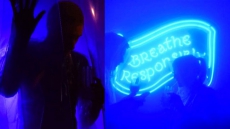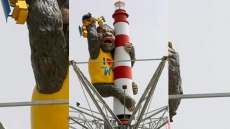Confirming a major prediction of Albert Einstein's 1915 general theory of relativity, scientists have, for the first time, observed gravitional waves, or ripples in the fabric of spacetime, arriving at Earth from a cataclysmic event in the distant universe.
Dubbed as the breakthrough of the century, the international team of scientists believes that the detection of gravitational waves will open an unprecedented new window to the cosmos.
Gravitational waves carry information about their dramatic origins and about the nature of gravity that cannot be obtained from elsewhere.
Physicists have concluded that the detected gravitational waves were produced during the final fraction of a second of the merger of two black holes to produce a single, more massive spinning black hole. This collision of two black holes had been predicted but never observed.
The gravitational waves were detected on September 14, 2015 by both of the twin Laser Interferometer Gravitational-wave Observatory (LIGO) detectors, located in Livingston, Louisiana, and Hanford, Washington.
The LIGO observatories are funded by the US National Science Foundation (NSF), and were conceived, built and are operated by the California Institute of Technology (Caltech) and the Massachusetts Institute of Technology (MIT).
"Our observation of gravitational waves accomplishes an ambitious goal set out over five decades ago to directly detect this elusive phenomenon and better understand the universe, and, fittingly, fulfills Einstein's legacy on the 100th anniversary of his general theory of relativity," said Caltech's David Reitze, executive director of the LIGO Laboratory.
The discovery, accepted for publication in the journal Physical Review Letters, was made by the LIGO Scientific Collaboration and the Virgo Collaboration using data from the two LIGO detectors.
Based on the observed signals, LIGO scientists estimate that the black holes for this event were about 29 and 36 times the mass of the sun, and the event took place 1.3 billion years ago.
About three times the mass of the sun was converted into gravitational waves in a fraction of a second -- with a peak power output about 50 times that of the whole visible universe.
By looking at the time of arrival of the signals -- the detector in Livingston recorded the event seven milliseconds before the detector in Hanford -- scientists can say that the source was located in the Southern Hemisphere.

According to general relativity, a pair of black holes orbiting around each other lose energy through the emission of gravitational waves, causing them to gradually approach each other over billions of years, and then much more quickly in the final minutes.
During the final fraction of a second, the two black holes collide at nearly half the speed of light and form a single more massive black hole, converting a portion of the combined black holes' mass to energy, according to Einstein's formula Emc2.
This energy is emitted as a final strong burst of gravitational waves. These are the gravitational waves that LIGO observed.




